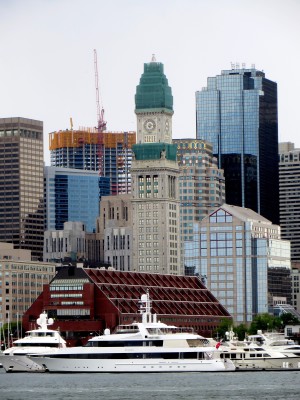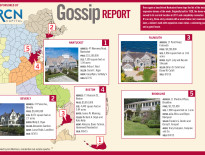A federal judge’s ruling barring a restaurant on Boston’s Long Wharf has raised new questions about the legality of commercial uses at the popular tourist attraction.
The National Park Service argued in a lawsuit that the pavilion is limited to outdoor public recreation uses because the Boston Redevelopment Authority (BRA) received a federal Land and Water Conservation grant to upgrade the wharf in 1981. The pavilion was completed in 1988. On Wednesday, U.S. District Court Judge Patti Saris ruled in the park service’s favor, denying the restaurant project.
During a recent court hearing, Boston Redevelopment Authority (BRA) counsel argued that many commercial establishments on the pier could be put in legal jeopardy if the court upheld the recreational restrictions. Saris acknowledged the BRA’s argument that parts of Long Wharf have been used for commercial purposes including charter vessels and harbor ferries, but noted her ruling only addresses the restaurant proposal.
The dispute dates back to 2006, when the BRA first began drawing up plans for a bar and restaurant at the pavilion. The park service initially supported the request after the state Division of Conservation Services submitted a 1983 map that indicated that pavilion was not part of the restricted area.
But in 2012, the park service found a 1980 map that indicated the opposite and decided to challenge the project.
In her decision, Saris noted that the BRA used the grant money for various upgrades including repairs of the seawall, pilings and decking – not just the pavilion and park that occupy 20,000 square feet.
“For this reason, it makes sense that the BRA’s proposed restricted area extended beyond the park at least to other seaward parts of Long Wharf that benefitted from (the grant) funding,” Saris wrote.
The ruling comes as a BRA advisory committee continues to discuss requiring developers to pay for enhanced public amenities on Long Wharf and the central waterfront.
The group has talked about new harbor ferry terminals, food concessions, heated waiting areas for harbor ferries and park space as a condition of approval for major projects such as Chiofaro Co.’s proposed 1.3-million-square-foot Harbor Towers on India Row and a 285-foot-tall residential tower on the Hook Lobster site.
In addition, The Boston Marriott Long Wharf hotel has proposed adding 20,000 square feet of retail and restaurant space in five additions to its ground floor.
BRA spokesman Nicholas Martin said the agency is reviewing the decision and exploring its options.




 |
| 

